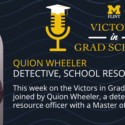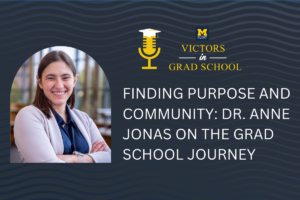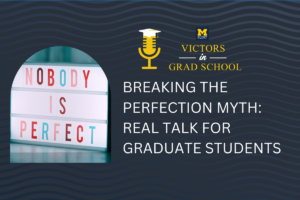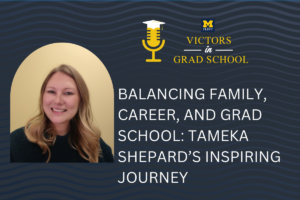The transition from undergraduate to graduate school can be challenging and daunting, especially for first-generation college students. In this blog post, we will delve into the experiences of Quion Wheeler, a detective and school resource officer with the Pontiac School District, who pursued a master’s degree in public administration at the University of Michigan’s Rackham Graduate School. Quion’s journey reflects the struggles, triumphs, and valuable lessons learned through the transition from undergraduate to graduate education.
First-Generation College Experience
Quion shares that he was a first-generation college student, and the pressure to pursue higher education was significant. His undergraduate experience at the University of Michigan Flint began with struggles and a lack of academic confidence. However, the desire to fulfill his parents’ aspirations and prove himself as a capable student motivated him to overcome these challenges. This reflects the common experience of many first-generation college students who face unique obstacles as they navigate the unfamiliar terrain of higher education.
Transition to Graduate School
When Quion decided to pursue his graduate studies, he emphasized that it was a decision motivated by personal goals rather than external pressures. This shift in motivation demonstrates the evolution of his educational journey, transitioning from fulfilling the expectations of others to investing in himself and his future. The transition from undergraduate to graduate school requires a shift in mindset, and Quion’s experience highlights the importance of recognizing one’s personal aspirations and making decisions that align with individual goals.
Preparing for Success in Graduate School
Quion’s journey reflects the significance of preparation and focus in achieving success in graduate school. He highlights the pivotal role of mentorship, academic advising, and building strong connections in facilitating academic growth and success. His dedication to academic improvement, demonstrated through earning higher grades and seeking out support systems, underscores the determination required to excel in graduate-level coursework. Furthermore, Quion’s proactive approach in establishing study groups and utilizing available resources emphasizes the importance of resilience and perseverance in navigating the demands of graduate education.
Choosing the Right Graduate Program
In selecting a graduate program, Quion’s decision to pursue public administration stemmed from his aspiration for leadership roles within his professional domain of law enforcement. His rationale for choosing a program aligned with his career aspirations exemplifies the significance of strategic decision-making in pursuing graduate education. Additionally, the influence of mentors and existing networks in his decision-making process emphasizes the value of seeking guidance and leveraging existing support systems when evaluating graduate program options.
Integration of Graduate Learning in Professional Practice
Quion’s experience in graduate school not only equipped him with theoretical knowledge but also instilled strategic planning skills, which he has integrated into his professional journey. His ability to apply the principles of strategic planning to address challenges in law enforcement and education underscores the practical relevance of graduate education in shaping professional capabilities and problem-solving acumen. This exemplifies the transferability of graduate learning into real-world contexts, emphasizing the holistic impact of advanced education on professional development.
Advice for Prospective Graduate Students
Reflecting on his journey, Quion offers valuable advice for prospective graduate students. He emphasizes the significance of conducting thorough research to align educational pursuits with long-term career objectives. His encouragement for individuals to consider the practical applicability of their graduate degrees and to develop a comprehensive career plan underscores the importance of intentional decision-making and foresight in pursuing advanced education.
Conclusion
Quion Wheeler’s journey from undergraduate to graduate school and into his professional career exemplifies the transformative impact of higher education for first-generation college students. His experiences underscore the value of resilience, strategic decision-making, and proactive preparation in transitioning to and succeeding in graduate education. Aspiring graduate students can draw inspiration from Quion’s narrative, utilizing his insights to navigate their own journeys and strive for success in their pursuit of advanced education.
TRANSCRIPT
Dr. Christopher Lewis [00:00:01]:
Welcome to the Victor’s in Grad School, where we have conversations with students, alumni, and experts about what it takes to find success in graduate school.
Dr. Christopher Lewis [00:00:11]:
Welcome back to Victors in Grad School. I’m your host doctor Christopher Lewis, Director of graduate programs at the University of Michigan Flint. Really excited to have you back today. Every week, I love being able to talk to you, to sit down with you, to Walk through this journey that you’re on as you’re either thinking about graduate school, going through graduate school, looking at that light at the end of the tunnel as you’re preparing to graduate from graduate school. You know, this show is all about helping you find success in that journey. And I love being able to walk with you on because I know that everybody’s journey is just a little bit different, and it’s important. It’s important to talk about these issues, may help you to think about things that you might not have thought about before and also learn from other people because the best way that you can Prepare yourself is to talk to others that have gone before you. And every week, I am so happy to be able to bring you different guests that have done just that.
Dr. Christopher Lewis [00:01:07]:
This week, we’ve got another great guest. Keon Wheeler is with us today, and Keon is a detective and school resource officer with the Pontiac School District. And he did his undergraduate work at the University of Michigan Flint and then ended up going and getting a master’s degree in public administration through the Rackham Graduate School at the University of Michigan, and we’re gonna talk to him about his own experiences. Keon, thanks so much for being here today.
Quion Wheeler [00:01:36]:
No problem. Thank you for having me.
Dr. Christopher Lewis [00:01:38]:
It is my pleasure. I am really excited to be able to chat with you. And One of the first things that I love to do is be able to really turn things back in time. And I know that you did your undergraduate work at the University of Michigan Flint, And at some point, while you were in that undergraduate degree, as you were graduating, as you’re moving Into that 1st professional role, you made a decision. You made a decision that you wanted to continue your education. Talk to me about what was going through your head and what what were those reasons that made you choose that you wanted to continue and get that graduate degree?
Quion Wheeler [00:02:11]:
So in all honesty, Starting my undergrad experience, I was a 1st generation college student. So, like, graduating high school, There was a lot of pressure in terms of, like, what the next step would be. I knew that if I applied myself, I knew that I would do well. But I knew, like, how important it was for my my parents to see me go to college. So in the beginning of my college experience. I struggle a lot, and I think I I would attribute a lot of those feelings to just not feeling confident enough. But once I figured out that I could perform just as well as the, the other students, I was able to kinda shift in a gear. So I told myself that my undergrad degree was for my parents because it was so important to them to see their children attend school and graduate.
Quion Wheeler [00:03:05]:
So when I decided to go into my graduate studies, I honestly didn’t have, like, a Professional plan because that time went by so fast. But I knew, and I had decided at that time, that I wanted to do something for myself, And that’s how I I stumbled upon the horse riding graduate program, and I and I took up, public administration.
Dr. Christopher Lewis [00:03:28]:
So you talk about the fact that your undergraduate degree was for your parents, that your graduate degree was for you, And that you, as a 1st generation college student, you kinda had to figure things out for yourself, and I’m sure that as you continued on, you continue to be a 1st generation college student, whether you’re an undergraduate student or you’re a graduate student and you’re still trying to figure things out along the way. So talk to me a little bit about that transition, that transition that you had to go through as you were Looking at graduate school and trying to make sure that you’re going to be prepared for that next step Because going from undergraduate to graduate work is definitely a little bit different. So what did you have to do to prepare yourself To get yourself in the right either mental space or or space in general that would allow for you to be able to be successful in that next step for your education.
Quion Wheeler [00:04:24]:
So, obviously, my 1st 2 years of undergrad, I struggle Just for, like, focus and, you know, what class to take, I know I had to I ended up having to retake some classes. So by the time I got to my junior year From undergrad, I was pretty much laser focused. Like, I at that point, I I had a couple mentors. I have been well versed in, like, academic advising. I went to, like, my department at the time, which was, you know, criminal justice, and I was able to make some solid connections on what classes I need, what classes I didn’t need. So from my junior year up until I graduated undergrad, I was really locked in. I mean, I was getting 3.4 is 5. I was passing all my classes with flying colors.
Quion Wheeler [00:05:09]:
So when I decided to go to grad school, I knew that I had be, if not as focused, a little bit more focused, but I was already prepared because at that point, I was committed to doing well. So When I got accepted into the graduate program, I was admitted on a probationary status because my Akeem wasn’t quite a 3 point o, so that just kinda lets you know, like, how much work I had to do to kinda build up from 1st to sophomore to junior year to get there, but my transcript shows so much development, and, obviously, I had some great recommendation letters. So when I was first admitted, they told me that I couldn’t get lower than, like, a b plus in all of my classes. So that was, like, motivation. Because I was like, you know, I’ve done this. You know, I’ve done this in grad school. I’ve kinda I mean, in undergrad, I’ve been fine to us. So now it’s just time to really Buckle down and and focus on what it is that that I wanna do, and and I never got below a 3 in grad school.
Quion Wheeler [00:06:17]:
And I was really proud of that because, again, when I started college, I didn’t have that that academic confidence. But then I have proved myself to be proficient in things that I wasn’t quite proficient in undergrad, so that’s really how I would be here.
Dr. Christopher Lewis [00:06:31]:
So you chose to go to the Rackham Graduate School for, you know, a public administration degree. Talk to me about that decision, and what made you decide that that’s not only the right school for you, but the right program for you?
Quion Wheeler [00:06:47]:
So I’ve always felt like a leader in the things that I’ve done academically or even in my extracurricular activity. So when I thought, like, Public administration, I saw, like, leadership grows. You know? So, obviously, going into law enforcement, I thought that a public administration degree would Go, Will, if I decided I wanted to become a director of security or chief of police or At one point, I was very interested in in juvenile probation, and I thought that having a public administration degree Along with law enforcement experience would allow me to kinda, like, catapult to some of those positions. So that was my original thinking, And I didn’t want to get a criminal justice administration degree because I already had an undergrad. I just didn’t really see the purpose of just getting 2 degrees in the same thing. So I decided to just go general program instead of picking, like, a, Like a specific concentration because I I just didn’t wanna pigeonhole myself. So that’s why I chose, like, public administration because I At the time and even still now, I see myself in in more of a a a leadership capacity, and that’s why I chose department administration.
Dr. Christopher Lewis [00:08:05]:
And was there a specific reason that you chose to go to the University of Michigan Rackham Graduate School for that program versus deciding to go to another program?
Quion Wheeler [00:08:16]:
I was already well established on campus. I had some I had already developed a a really solid network, And I was comfortable. You know? I was working on campus with the educational opportunity initiatives. I was already doing the work, so It just felt like the right move. And I knew one of my mentors had actually graduated from the program, and so he gave me some good information or how how the program benefited him, and that’s pretty much how I decided to go forward with him.
Dr. Christopher Lewis [00:08:46]:
Now I mentioned the fact that When you go from undergraduate to graduate school, there is a difference. There’s a difference in the way the the professors teach. There’s a difference in the requirements and the expectations that faculty have on students themselves, and you have to prepare yourself A little bit differently for the classes that you’re in and for the rigor of the program that you’re in as well. What did you have to do to Set yourself up for success as you entered into the program, and what did you have to do to maintain that success as you went through the program and eventually got to to graduation.
Quion Wheeler [00:09:25]:
Initially, I realized, like, in my 1st class, that I was, like, amongst one of the younger students in the classroom. Like, a lot of my classmates Had already been working in their professions for decades or more. So this was just more so, like, the degree to Push them into more managerial roles or whatever it was. So for me, I had to just kinda establish a group of of people that I can, you know, relate to. And so what I did was I was always friendly and easygoing, so I connected with students who were kinda focused on the same thing, some of the students who were maybe, like, 1, 2 years out of undergrad, and we We develop, like, study groups or focus groups for, like, certain classes, and I would dedicate most of my weekends, I would go to The Riverfront, they had a a new computer lab there, and I would spend maybe 4 to 5 hours, you know, every other Sunday, depending on what the workload is, and and it would be myself along with the study group. And we would just focus on whatever assignments that we had, just Kinda like compare strategies to make sure that we were meeting the criteria. I really just took time to really thoroughly understand the assignments. And if I had questions.
Quion Wheeler [00:10:40]:
You know, obviously, I reached out to the professors and just to make sure that I was doing what was required. So I gave up a lot of time, and I knew that it would be tedious, but I was focused. So really just developing those study groups, Making relationships with people in my class. Just kinda getting out of my comfort zone, asking questions, not being afraid of not knowing the answer. Really kinda like knowing What you don’t know because for a lot of us, even though we were in different positions in life given our age or professions, you know, we still were trying to obtain a degree. So I just try to stay on top of my assignments and and keep things there.
Dr. Christopher Lewis [00:11:19]:
Completely understand that. And sometimes having to Keep up on things, especially as it’s being kind of dumped on you. It gets challenging, it gets stressful, and you have to manage that stress in different ways. Now you’ve continued your career. You’ve finished up that graduate degree, and you continued on. You’re working for the Pontiac Schools right now. And as you look back at your graduate degree and you think about what you learned in that graduate degree, how do you feel that the graduate degree prepared you for the work that you have done since graduating.
Quion Wheeler [00:11:55]:
One of my final assignments, Like, I came up with, like, a strategic plan for the job that I was working at during my time in in grad schools. So, obviously, like, the theme of that strategic plan was my ideology along with some statistics on how the program could run efficiently or run more efficiently. So I I’ve I’ve kinda always been in that mindset of, like, strategic planning, like, since I’ve left the University of Michigan Flint and navigating into law enforcement. Alright? So I’ve had An opportunity to work for the Flint police department where I worked there for 4 years, and there were a lot of challenges On a community level, on a department level. And so I will always find myself going back to that Strategic planning mindset of, like, if I were to become in a position to implement change, where would I begin? So one of the big focal points for me was, At that time, it was like manpower. Like, we really we really struggle with keeping officers in the city of Flint, And the turnover rate was super high because of the call volume and, obviously, just, like, the manpower shortage, so it was kinda like spinning your wheel all the time. And now I come out to where I work for the Oakland County Sheriff’s Office now, and it’s a large agency. And it’s just way more opportunities.
Quion Wheeler [00:13:22]:
It’s way more people. But in my role as a school resource officer, Obviously, I can identify, like, the challenges, like, within the school system as it relates to kids and literacy and different things like that. So my mind naturally goes to, you know, how can I fix this? And that’s kinda, like, One of the skills that I developed in grad school, like, due to that process is thinking of, you know, from a manager or a supervisory standpoint, strategic planning, just How do you work and and help people realize that we’re all on the same team trying to reach the same goal? Like, it’s just that’s kinda like where my mindset has Staying since then.
Dr. Christopher Lewis [00:14:03]:
Now you’ve given a number of piece of advice and a number of things that that you have learned in the journey that you went through yourself. As you look back at your graduate education, what are some tips that you might want to offer to others that are considering graduate school that’ll help them find success sooner.
Quion Wheeler [00:14:22]:
If you are pondering the idea of going to grad school, I would say be sure. You know? Like, actually take time to research programs. I didn’t really do much research. Like, I I just knew that I wanted to go to horse rack. I’m, like, just considering The information that I received from several people before, and it just felt like the right fit. But if there was something that I could go back and do I probably would have taken more time as a young professional just to kinda figure out where I wanted to fit, like, Professionally overall. Because now I’m in I’m in this limbo. Right? So I’ve I’ve had my graduate degree since 2015, and I’m in a space where I’m like, Man, am I really using my degree? Because I’m in a unionized position, so it’s not like I’m getting more pay for having a master’s versus a person with, like, a high school diploma in this particular profession.
Quion Wheeler [00:15:13]:
So I would encourage students to take more time to see how they can maximize On their degree, depending on, like, what career field they choose to get into. Now I I definitely think that having my MPA has made me More marketable because that’s not a common trend for law enforcement officers to be well educated. So I think it works there, but really just taking that time to think about what it is that you wanna do and how it It’s in 5 year plan, a 10 year plan. Like, that’s not something that I really did. It was like, okay. I graduated undergrad. Like, what’s next? Okay. I don’t have a what’s next, so let me go to school.
Quion Wheeler [00:15:54]:
And I think sometimes people get caught up in that, and sometimes it works, and sometimes it don’t. I don’t regret it. Like, I’m I’m very thankful for my experience, and I’m very proud of myself for the things that I’ve accomplished today. But if I could just suggest Those few things, that’s what I would suggest.
Dr. Christopher Lewis [00:16:11]:
Well, Kean, I just wanna say thank you. Thank you for sharing your story today. Thank you for your willingness To explore this with me and to share your experiences and things that you’ve learned along the way because I know it’s going to help others in so many different ways, And I wish you all the best.
Quion Wheeler [00:16:26]:
Thank you. Thank you for having me.
Dr. Christopher Lewis [00:16:27]:
The University of Michigan Flint has a full array of masters and doctorate programs if you are interested in continuing here in education. Whether you’re looking for in person or online learning options, the University of Michigan Flint has programs that will meet your needs. For more information on any of our graduate programs, visit umflint.edu/graduateprograms to find out more. Thanks again for spending time with me as you prepare to be a victor in grad school. I look forward to speaking with you again soon as we embark together on your graduate school journey. If you have any questions or want to reach out, Email me at flintgradoffice@umflint.edu.





